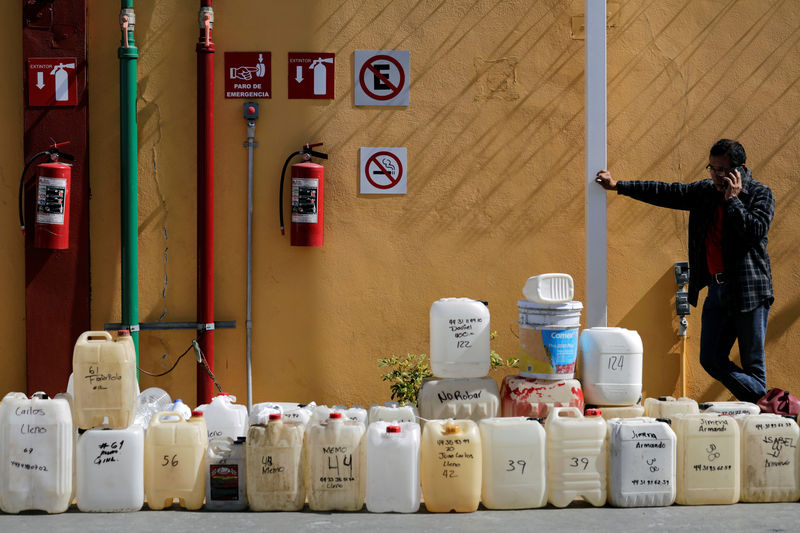By Sharay Angulo
MEXICO CITY (Reuters) - Gasoline shortages in Mexico sparked by a crackdown on fuel theft prompted warnings from business leaders that industries like carmaking will suffer if the shortfalls persist as lines at gas stations in the capital grew on Wednesday.
The drive to eradicate a crime that has deprived state coffers of billions of dollars is President Andres Manuel Lopez Obrador's first major move against chronic corruption since taking office on Dec. 1, but risks angering consumers and hurting the economy.
Criminal groups have been tapping pipelines and stealing tanker trucks laden with diesel and gasoline in the oil-producing country for years, reselling it illicitly, often with apparent impunity.
However, by closing off pipelines and refineries while it tracked the thefts, the government has triggered shortfalls and long lines at gas stations in several states.
Despite assurances from government officials that the situation is in hand, industry concern is growing.
Juan Pablo Castanon, head of the powerful Mexican business lobby CCE, told Milenio television bottlenecks in fuel supply were starting to affect manufacturing.
"Not just workers in their movements to the workplace, but also production plants, particularly in the auto industry, which isn't able to get enough fuel for new vehicles," he said.
Alfredo Arzola, director of the automotive industry hub in the state of Guanajuato, a major car-making area hard hit by the fuel problems, told Reuters assembly plants could begin idling within a week if no fix was found.
"Investments are being put at risk," he said.
Lopez Obrador said fuel theft has dropped to the equivalent of 27 truckloads a day from "over a thousand" since he sent the army to police installations of state-oil company Petroleos Mexicanos, better known as Pemex, last month. On Wednesday he vowed to hold firm.
"It would be easy to open the pipes and say: 'The situation is normal again,' but we will not knowingly allow the theft to persist... We'll resist all pressures, whatever they are," Lopez Obrador told a news conference.
INDUSTRY WORRIES
Energy Minister Rocio Nahle said on Wednesday that Pemex's 74 fuel storage terminals were full as of Dec. 20. The government's plan to cut fuel transport via several vulnerable pipelines began a week later on Dec. 27.
She said the government is monitoring Pemex's pipeline network for any drop in pressure caused by illegal taps, and shutting the flow of fuel if such taps are detected.
Nahle said that some 5,000 fuel tanker trucks are working across the country to improve distribution to gas stations, but declined to say when supplies to gas stations will return to normal.
Earlier in the week, Lopez Obrador said Pemex is producing about 200,000 barrels per day (bpd) of gasoline, versus the roughly 800,000 bpd that Mexican motorists consume each day.
The difference is made up with imports, almost all of which come from the United States. The president has pledged to cut imports once domestic production grows.
At the major import hubs of Pajaritos and Tuxpan on Mexico's Gulf coast, 24 tanker ships were waiting on Wednesday to unload their cargos, including both motor and heating fuels, according to vessel tracking data from Refinitiv Eikon.
In Mexico City, lines of drivers snaked from gas stations making panic purchases out of fear supplies would run low, despite assurances from Lopez Obrador there was plenty of fuel available in the country.
Ernesto Villanueva, 34, said he had driven into town from the suburb of Iztapalapa to search for fuel on Tuesday night.

"It's a bit easier to get at night, but last night already the gas was finished in that area. I'm telling my teammates to come here, buy a jug and we can stock up."